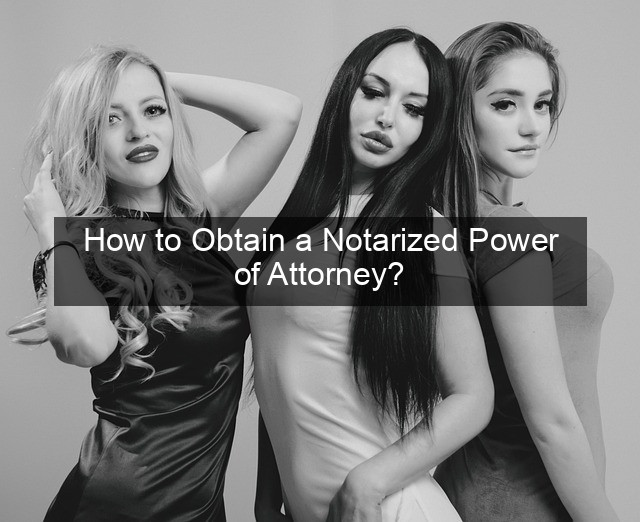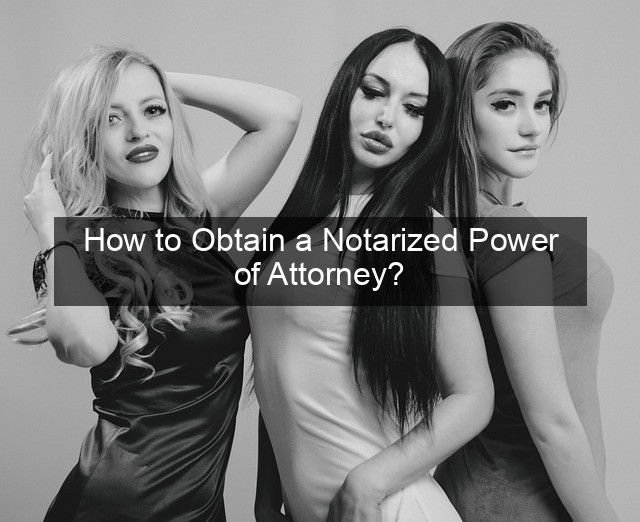How to Obtain a Notarized Power of Attorney?

- How to Obtain a Notarized Power of Attorney?
- How to Obtain a Notarized Power of Attorney
- Types of Power of Attorney
- Durable Power of Attorney
- Non-Durable Power of Attorney
- Special Power of Attorney
- Steps to Obtain a Notarized Power of Attorney
- Drafting the Document
- Locating a Notary Public
- Signing and Notarization
- Understanding the Importance of a Notarized POA
- Legal Validity and Enforceability
- Protection Against Fraud and Misuse
- Conclusion
- Frequently Asked Questions

How to Obtain a Notarized Power of Attorney
A Power of Attorney (POA) is a crucial legal document that grants another person, known as your agent or attorney-in-fact, the authority to act on your behalf. This authority can encompass a wide range of actions, from managing finances and making healthcare decisions to handling real estate transactions. A notarized Power of Attorney adds an extra layer of validity and security to this document. Notarization confirms the signer’s identity, ensuring the document’s authenticity and reducing the risk of fraud. Understanding the process of obtaining a notarized POA is essential for anyone considering this important legal arrangement. It involves specific steps and considerations that vary depending on your location and the type of POA you require.
Types of Power of Attorney
Durable Power of Attorney
A Durable POA remains effective even if you become incapacitated or mentally incompetent. This type of POA is crucial for ensuring your affairs are managed according to your wishes, even if you are unable to make decisions yourself. It provides peace of mind knowing someone you trust can handle your finances, healthcare, and other important matters. Choosing the right agent is paramount, as they will hold significant responsibility.
Selecting a trustworthy and capable agent is crucial for a Durable POA. This individual should be someone you implicitly trust to act in your best interests. Open communication and clear instructions are essential to ensure your agent understands your wishes. Regularly reviewing your POA is also advisable to ensure its continued relevance to your circumstances.
The scope of a Durable POA can be broad or limited, depending on your specific needs. You can grant your agent authority over all your affairs or restrict their power to specific areas, such as managing your finances or making healthcare decisions. Clearly defining the scope of authority in the document is essential to avoid confusion and potential disputes.
Non-Durable Power of Attorney
A Non-Durable POA is effective only for a specific period or until a specific event occurs. This type of POA is often used for limited purposes, such as authorizing someone to sign documents on your behalf while you are unavailable. It is less comprehensive than a Durable POA and automatically terminates upon the specified event or timeframe.
Non-Durable POAs are often used for specific transactions, such as closing a real estate deal or managing a business affair while you are out of town. They provide a convenient way to delegate authority for a limited time without granting ongoing control over your affairs. The specific powers granted under a Non-Durable POA should be clearly outlined in the document.
The termination of a Non-Durable POA occurs automatically upon the specified event or date outlined in the document. This could be the completion of a specific task, the expiration of a defined timeframe, or your return from an absence. Once terminated, the agent no longer holds any authority to act on your behalf.
Special Power of Attorney
A Special POA grants your agent authority to act on your behalf in a specific situation or for a particular purpose. This could include selling a property, handling a legal matter, or managing a specific financial transaction. It provides a targeted approach to delegating authority, limiting the agent’s power to the designated area.
Creating a Special POA allows you to maintain control over your affairs while granting specific authority to another person. It is a useful tool for situations where you need assistance with a particular task but do not wish to grant broad authority over your affairs. The document should clearly define the specific powers granted to the agent.
The duration of a Special POA is typically limited to the completion of the specific task or the occurrence of the specified event. Once the purpose for which the POA was created has been fulfilled, the agent’s authority automatically terminates. This ensures the agent’s power is restricted to the designated purpose.
Steps to Obtain a Notarized Power of Attorney
Drafting the Document
The first step is to draft the POA document itself. You can use a template or consult with an attorney to ensure the document is legally sound and tailored to your specific needs. Clearly defining the powers granted to your agent is crucial to avoid ambiguity.
When drafting the POA, specify the scope of authority granted to your agent. This may include managing finances, making healthcare decisions, handling real estate transactions, or other specific actions. The document should be comprehensive and clear, leaving no room for misinterpretation.
Including specific limitations and restrictions in the POA can help protect your interests. You can specify actions your agent is not permitted to take, ensuring they act within the boundaries you have set. This level of detail helps prevent potential misuse of the granted authority.
Locating a Notary Public
Once the POA is drafted, you need to find a notary public. Banks, post offices, and law offices often have notaries available. You can also use online directories to locate a notary in your area.
When choosing a notary, ensure they are properly commissioned and authorized to perform notarial acts in your jurisdiction. This ensures the notarization is legally valid and recognized by relevant authorities.
Verifying the notary’s credentials and reputation is essential for ensuring the integrity of the notarization process. You can contact your state’s notary commission or licensing agency to confirm the notary’s standing and verify their authorization.
Signing and Notarization
Both you and your agent must be present before the notary public to sign the POA. Bring valid identification, such as a driver’s license or passport. The notary will witness your signatures and affix their official seal and signature to the document.
The notary will verify your identities and ensure you are signing the document willingly and under your own free will. They will also confirm that you understand the contents of the document and the implications of granting power of attorney.
After the signing and notarization process is complete, the notary will record the transaction in their official notarial journal. This provides a permanent record of the notarization, which can be used as evidence of the document’s authenticity.
Understanding the Importance of a Notarized POA
Legal Validity and Enforceability
Notarization provides legal validity and enforceability to the POA. It helps prevent challenges to the document’s authenticity and ensures it is recognized by courts and other legal entities.
A notarized POA carries more weight than a non-notarized document. It provides assurance that the signatures are genuine and the document is not fraudulent. This is particularly important for documents granting significant authority, such as a POA.
The notarization process adds a layer of legal protection for both the principal and the agent. It helps prevent disputes and ensures the POA can be used effectively for its intended purpose.
Protection Against Fraud and Misuse
Notarization helps protect against fraud and misuse of the POA. The notary’s verification of the signer’s identity and willingness to sign helps deter fraudulent activities.
By confirming the signer’s identity, the notary helps prevent someone from forging a signature or impersonating another person to obtain power of attorney. This safeguards against unauthorized access to your affairs.
The notary’s presence and oversight during the signing process deter potential coercion or undue influence. This ensures the signer is acting voluntarily and understands the implications of the document.
Conclusion
Obtaining a notarized Power of Attorney is a crucial step in ensuring your affairs are handled according to your wishes. Whether you need a Durable POA for long-term care planning or a Special POA for a specific transaction, understanding the process and its importance is essential. By following the necessary steps and seeking professional guidance when needed, you can establish a legally sound and secure POA that protects your interests and provides peace of mind.
Frequently Asked Questions
What is the difference between a Durable and Non-Durable Power of Attorney?
A Durable POA remains in effect even if you become incapacitated, while a Non-Durable POA terminates upon a specific event or timeframe.
Do I need an attorney to create a Power of Attorney?
While you can use a template, consulting an attorney is recommended to ensure the document is legally sound and tailored to your needs.
How much does it cost to notarize a Power of Attorney?
Notary fees vary by location but are generally affordable.

Can I revoke a Power of Attorney?
Yes, you can revoke a POA as long as you are mentally competent. You must notify your agent and any relevant institutions in writing.
What happens if my agent misuses their authority under the POA?
You can revoke the POA and pursue legal action against the agent for any damages caused by their misuse of authority.
Where can I find a notary public?



